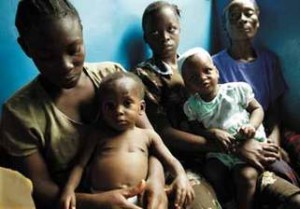The Peace Corps' World Malaria Day
Matt McLaughlin (Senegal 2006-10) is the Program Manager for Stomping Out Malaria in the Peace Corps’ Africa-wide malaria prevention program. As a PCV, Matt spent 4 years in southeastern Senegal developing a universal bed net distribution protocol which became the standard protocol for bed net distribution in the country. Prior to coming to Peace Corps, Matt worked as the Staff Development Director for the Greater Manchester Family YMCA.
In an email to me he outlined what the agency did on ‘World Malaria Day.’]
“We have three main activities this year for World Malaria Day:
1) World Malaria Month Competition/Blog About Malaria Month
We sponsored a competition between countries in the Africa Region to see which country could get the most Volunteers engaged in malaria prevention. The results are collected in a spreadsheet and Patrick’s team helped us create a fantastic data visualization at:http://stompoutmalaria.org/malariamonthmap/
As part of this competition we’re asking Volunteers across Africa to write blogs and inform their friends back home over facebook, twitter, etc. Some of the best blogs are mirrored on our website at: http://stompoutmalaria.org/news/ This page is a great resource for our ongoing malaria prevention work and even outside of world malaria day is updated pretty much daily.
2) Malaria Heroes
Putting a spotlight on the amazing work of our counterparts we ran a “Malaria Heroes” contest modelled on CNN’s Hero Awards. We asked Volunteers across Africa to nominate a PCV/Counterpart pair for this award. We then narrowed the field down to just over 10 entries and put them on our Facebook page here for public voting: https://www.facebook.com/media/set/?set=a.733279610045903.1073741831.208478415859361&type=1 Over the course of the two weeks when voting was open over 75,000 people visited our FB page.
Once the public had narrowed down the field to 5, we sent those 5 to a panel of experts (many of whom happened to be RPCVs) from MACEPA, the WHO, Abt Associates, the Against Malaria Foundation and ONE. They chose our winners. All finalists received a certificate signed jointly by Carrie and the Global Malaria Coordinator, Admiral Tim Ziemer. Additionally the winners received Nexus 7 tablets courtesy of the NPCA.
3) World Malaria Day Hangout on Air
On Friday we held a Google Hangout on Air from PC HQ. This is a multi-party video chat that is broadcast live and then archived on YouTube. You can see the content here: https://www.youtube.com/watch?v=yyRntzh8DUQ&list=PLM0oh3lEA63F3_HpIxCIV2QhnGNPL6LZ1 The panel discussion included Volunteers and their counterparts from Tanzania, Malawi, Cameroon and Rwanda as well as an RPCV from Senegal. We think this is a great way to allow our counterparts to tell their own story directly to the American people (and people all over the world).
In addition to our World Malaria Day activities, we’ve been spending a lot of effort over the past couple of months, and will be increasing this effort over the summer to evangelize a new malaria prevention methodology pioneered by Volunteers in Senegal. The PECADOM+ model is an active case detection model that involved community health workers doing sweeps of a village – door to door – looking for fevers to test and treat, as opposed to passively waiting for patients to come to him or her. This move from the defensive to the offensive in malaria prevention had exceptionally promising results in a handful of villages in 2012, and in 2013 a PCV worked with the ministry of health and CDC to do an extremely rigorous controlled trial of the methodology in 30 villages. The data recently came in and showed a 3X reduction in malaria at the height of the rainy season, and a 16X reduction towards the end of the rainy season.
You can get more information on this project here:
- YouTube Video:https://www.youtube.com/watch?v=PuO3sIU_UJ8
- Fact Sheet:http://stompoutmalaria.org/wp-content/uploads/2014/02/PECADOM-Factsheet-Stomp.pdf
Needless to say, we’re pretty excited about the potential of this methodology and are evangelizing it widely. I was just in Togo and Benin less than a month ago meeting with their respective ministries of health and both are excited to run pilots in their countries. Over the summer we will be developing an advocacy package around this intervention and sharing it widely. At about the same time, the results will be published in a peer reviewed journal and we hope to use the ASTMH conference in the fall as a springboard to share the idea more broadly.”
If you have questions about any of these programs, drop Matt a note at:
mmclaughlin2@peacecorps.gov
.
As someone who has been participating in programs designed to rollback malaria in Africa since he was a Peace Corps Volunteer in a village in Togo in the early 1970s, I am very please to read this article. Since 2009, I have been in Burkina Faso and we have been involved in a national effort to dramatically reduce the morbidity and mortality caused by malaria, particularly for children under five years of age. Sadly, so far, the millions of dollars spent and the solid applicationg of the latest ‘best practices’ have not achieved the results desired.
Matt McLaughlin,
It is so inspiring to see this cooperation across cultural and national borders.
Mark Wentling,
I think there is much to be learned from efforts that don’t achieve the results desired. To what do you attribute the fact that the results desired have not yet been seen? Do youthink that the efforts will ultimately be successful or do you see problems that are not yielding to “best practices?” Thank you.